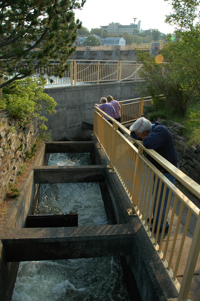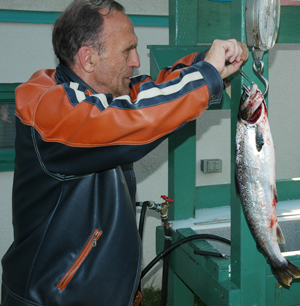 |
|---|
The Fishman of Mantane
We were hanging around the salmon ladder in the town of Mantane, Quebec, one morning in September, just wondering if we would see any fish trying to make their way around the dam. Instinct is a difficult thing to overcome, as everyone knows, and these fish would like nothing better than to proceed upstream beyond the dam to their traditional spawning grounds in the woods of the interior. It was a sunny morning, and for some reason, I was not the least bit concerned that we'd parked in an empty parking lot nearby without paying the fee.
Looking down into the water rushing through the chain of concrete chambers that runs alongside the dam, I found it impossible to see anything at all except white water flashing past us in the shadows. We were returning to our car when a short man with a crooked nose came out of the building near the top of the ladder and said, “Hey! Come on in here.”
We followed the fellow inside, and there, to our amazement, was a glass-cased chamber with a group of large salmon lying near the bottom. There were several chambers, in fact, lined up in a row, and the green water was rushing downward from one to the next, creating a continuous motion and spray on the surface of the tanks. This was a part of the ladder we hadn't seen. This was the place where the fish were in view.
The man who'd summoned us inside looked like a janitor. He wore jeans and a blue-black leather jacket, and he had the hoarse voice and demonstrative manner of a true peasant. His English was crude but expressive, and his meaning was always clear. He was very eager for us to get a better look at the salmon,which were little more than three dark shapes hunkering on the bottom of the tank in the corner opposite tothe glass wall.
“I'll get them to come out for you,” he said, and before we could protest he had walked off down the hall. A few minutes later he re-appeared on a catwalk above the tanks. We watched him through the glass as he opened a trap door and thrust a long pole down into the tank toward the salmon. They immediately left their comfortable corner and swam over to our side of the tank.
Once he'd reappeared he began to tell us all about the program to manage the salmon. I remarked that it hardly seemed possible that the fish could make their way up the violent stream of water that was rushing down from the upper tank.“They'll jump when they're ready,” he replied. In other words, he was happy to move the salmon into view for us, but he wouldn't make them jump.
It seems you get a permit to fish for a rather short period of time, and from one of 82 specified fishing sites along the river. If you happen to catch a fish, you're required to bring it to the authorities within two days. At that point they weigh and measure the fish and scrape off some scales, which they examine under a microscope and analyze in various ways to determine how healthy the fish is, what it's been eating, and quite a few other things.
 |
|---|
As luck would have it, two fishermen arrived from upstream with a few fish while we were standing around talking to our guide. We went outside and watched while the fish were weighed and measured, and our guide mumbled to us under his breathe, “It's a small fish, but they're happy. Its a small fish, but they're happy.”
Earlier that morning—before dawn, in fact—I had driven down to the port and noticed quite a few trucks parked near the entrance to one of the piers. I stopped and asked what was going on. The one English-speaker in the crowd came over and informed me that the fishermen were on strike because the fishing company was hiring Indians to do their work at a lower rate. Some words were exchanged between the fishermen in French, and the man I had been talking to drifted away into the crowd. They didn't know who I was, and evidently deemed it safer not to discuss their situation with a stranger, who, for all they knew, might be a newspaper reporter or an industrial spy.
I asked our salmon friend about the incident on the waterfront. He didn't seem too concerned about it.
“Oh, the fishermen get 60 cents for a pound of shrimp, and now the Indians are selling it for 50 cents a pound.” He replied dismissively, as if it were no big deal.
I asked him if any of the Indians fished for salmon. He shook his head. “Very few. Very few.”
Then I asked what seemed like an obvious question, considering how knowledgeable the man was about salmon. “Do you fish for them?”
“Oh, no. Too much work! You have to get up too early!”
And what about the Atlantic salmon that's been appearing so frequently in supermarkets lately? “That all comes from farms. There is no commercial Atlantic salmon,” he told me bluntly. “It's against the law to fish for it. With the new satellites we'll catch you every time. The other day a Spanish boat snuck across the line for a few hours, but we caught it. Gave it a 2 million dollar fine!”
We returned inside to the salmon ladder, and the fish were still loitering on the near side of the glass.
“Boy it would be fun to see them jump,” I said wistfully.
“They'll jump when they're ready. They'll jump when they're ready.”
* * *
Matane is a mid-sized town on the south side of the St. Lawrence River, about halfway from Quebec City to the tip of the Gaspe Peninsula. The scenery is rather flat and forlorn at first, growing more rugged out near the end, but all of it is fine. People go out to see the Perce rock and to watch for whales. We saw more than 60 whales while we were out there. An added attraction is the Gannett colony on Bonaventura Island.
To get a better look, click on the thumbnails below.
 |
 |
 |
 |
 |
|---|